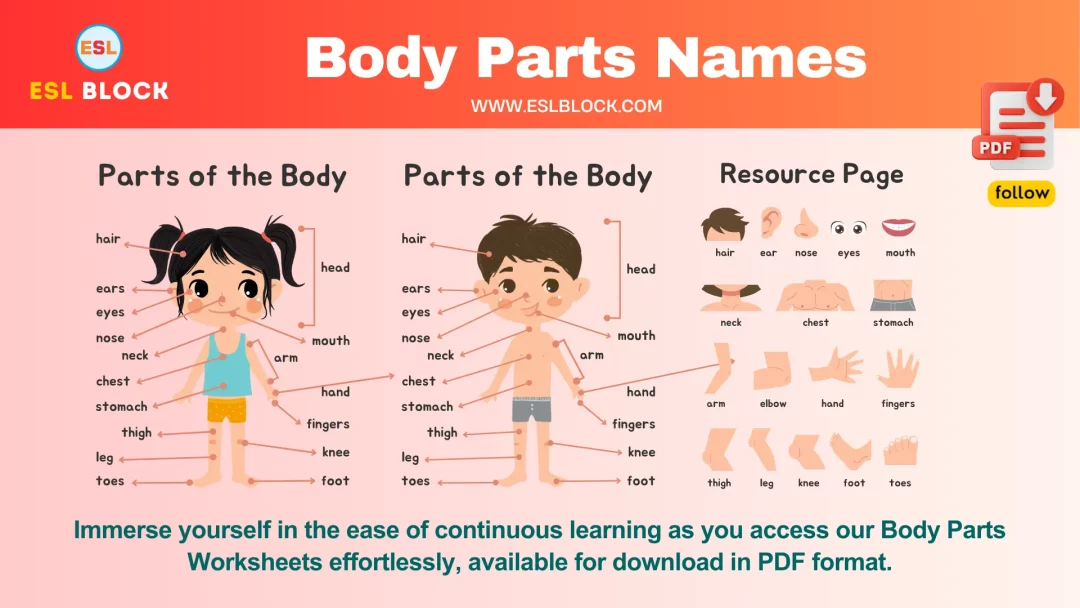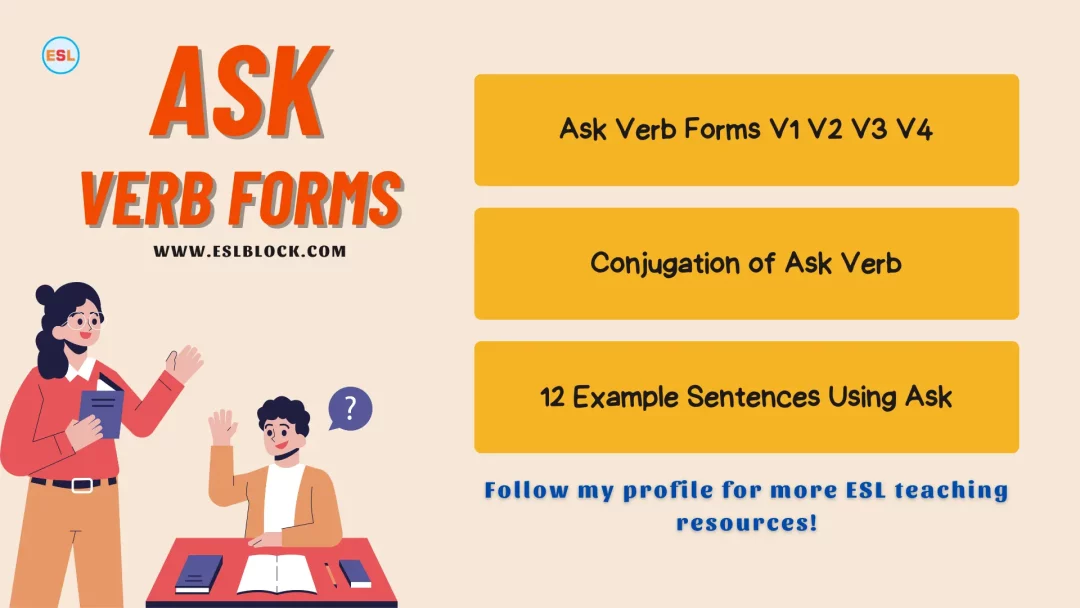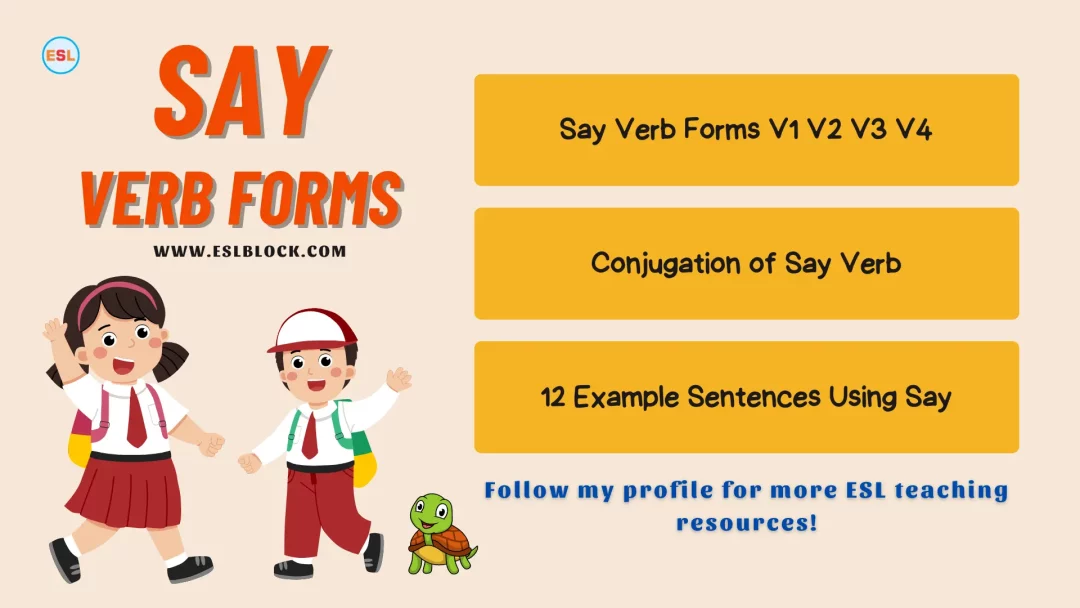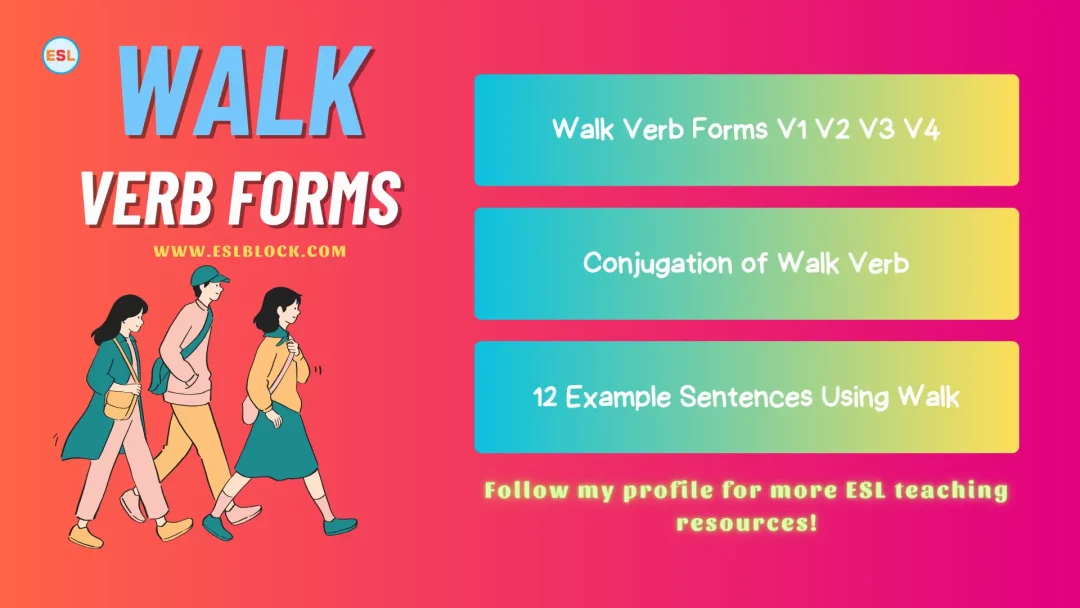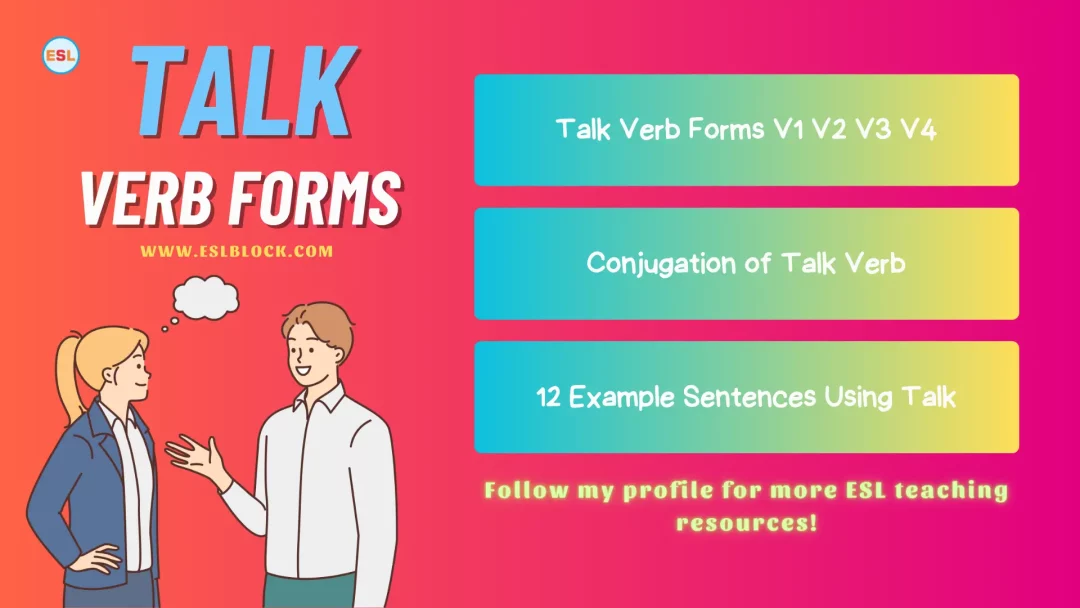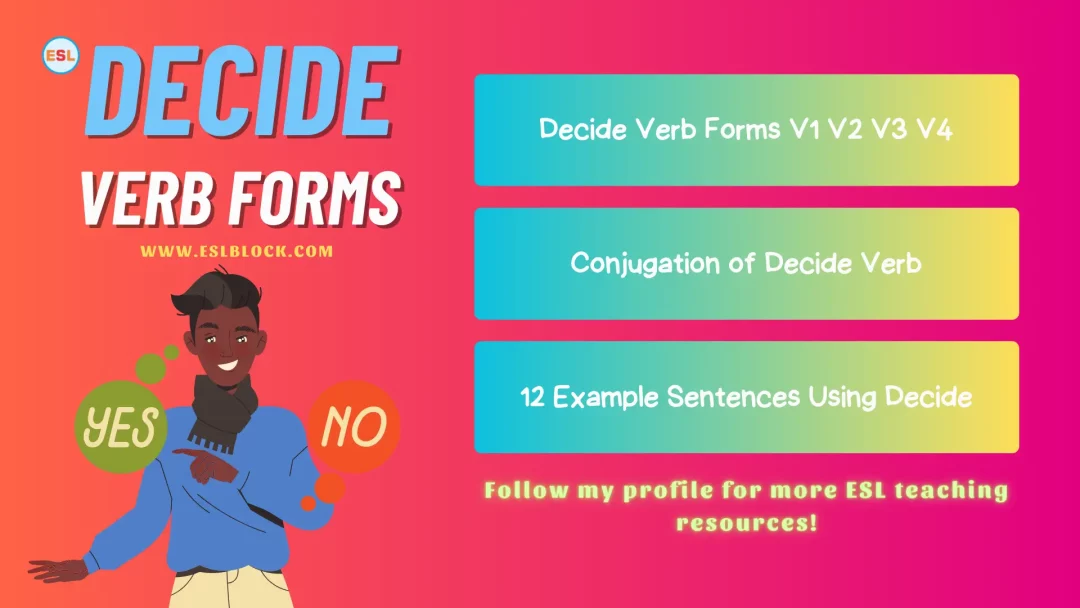Types of Interjections with Example Sentences
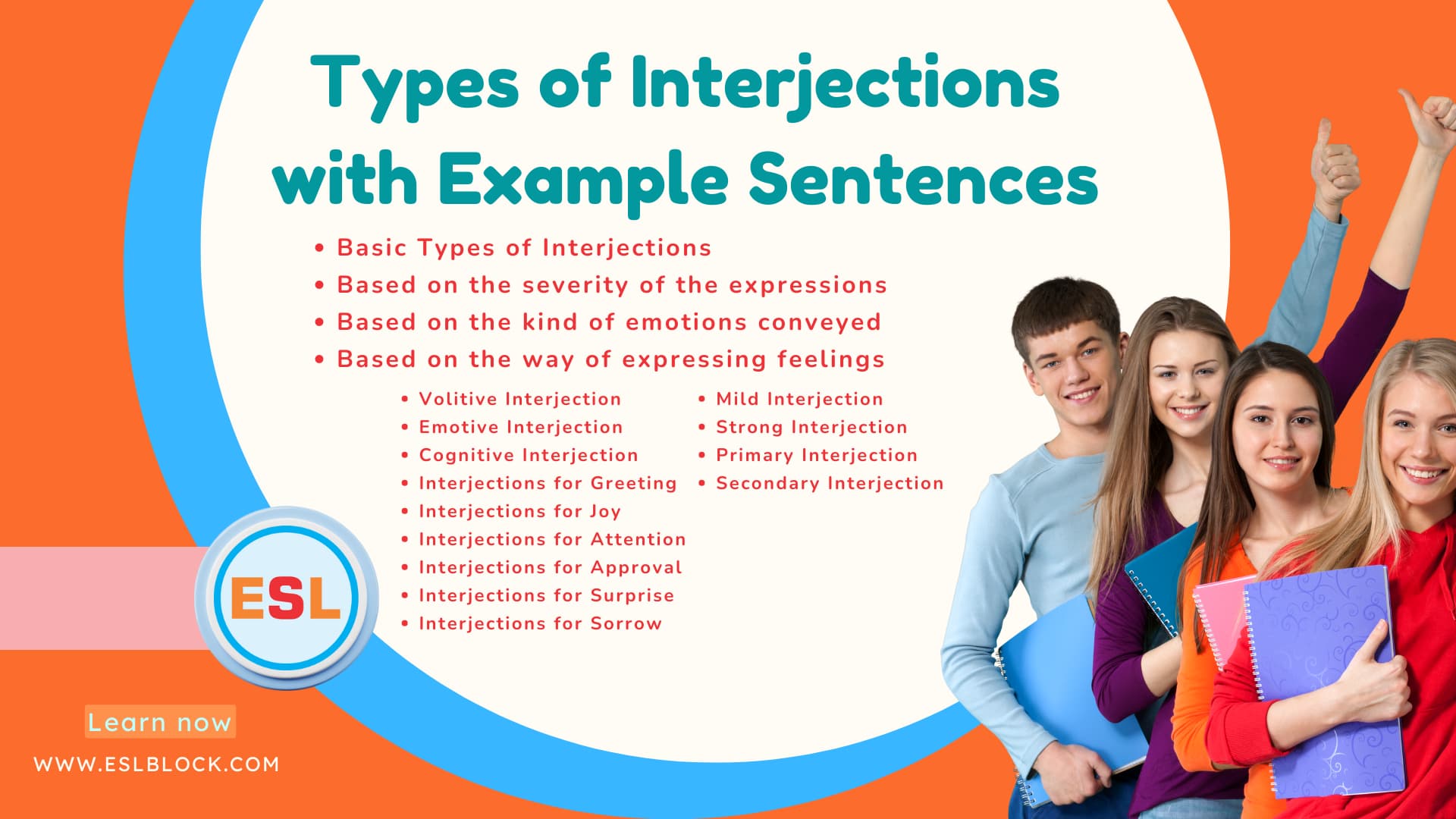
![]()
In this article, I am going to explain What are the types of Interjections with Example Sentences? An interjection is one of the nine parts of speech. The other eight are nouns, verbs, adjectives, pronouns, conjunctions, articles, adverbs, and prepositions. An interjection is a word that communicates a strong emotion through a single phrase. You may perform an interjections quiz for more understanding.
Also read: What is an Interjection of Parts of Speech in English Grammar?
Types of Interjections
There are two basic types of interjections, based on the severity of the expressions there are two types, based on the kind of emotions conveyed there are three types of interjections and there are six different types of interjections based on the way of expressing feelings.
Basic Types of Interjections
There are two basic types of interjections.
1. Primary Interjection
Words that are only interjections and are not classified as other Parts of Speech are referred to as Primary Interjections.
Primary Interjection List:
- Alas
- Aw
- Blah
- Gee
- Geez
- God
- Huh
- Hurray
- Meh
- Oh
- Oops
- Ouch
- Phew
- Ugh
- Wow
- Yuck
Primary Interjection Example Sentences:
- Oops, My mother.
- Wow! They had time to join him.
- Alas! I couldn’t be there on time.
- Hurrah, hurray for the queen!
- Wow! How smart she is.
- Oh! he forgot to bring my book!
- Alas! My father died.
2. Secondary Interjection
The adjectives, nouns, and other Parts of Speech that work as interjections on occasions are known as Secondary Interjections.
Secondary Interjection Example Sentences:
- Indeed, I was waiting for you.
- Goodness! How did they read all these books in a month?
- Holy cow! She is the last person I expected.
Based on the severity of the expressions
Based on the severity of the expressions there are two types of interjections.
1. Mild Interjection
The moderately mild expression of emotions and feelings is usually called Mild Interjections. The Mild Interjections are typically separated from the rest of the sentence with the help of commas.
Mild Interjection Example Sentences:
- Oh, I was looking for her.
- Well, it wasn’t straightforward.
- Hmm, Amelia is doing well.
2. Strong Interjection
The strong expressions are determined as Strong Interjections. Exclamation marks generally separate these types from the rest of the sentence.
Strong Interjection Example Sentences:
- Yay! I finally got the first position.
- Bingo! Found it.
- Ouch! That hurt me.
Based on the kind of emotions conveyed
Based on the kind of emotions conveyed, Interjections are generally grouped into three categories.
1. Volitive Interjection
Requests, commands, and wishes are usually communicated with Volitive Interjections. In the speech, “I want” phrases are changed with Volitive Interjections.
“Enough,” says the wish to quit hearing to someone and possibly put forward a contesting message.
Volitive Interjection Example Sentences:
- Shh! They have to keep it quiet. (I want them to be quiet)
- Ahem! I was looking at another issue. (I request your attention)
- Psst! I’ve started working out. (I want to attract attention in secrecy)
2. Emotive Interjection
Emotive Interjections are the words to express sudden spurs of emotions like surprise, delight, sorrow, disgust, and fear. These types usually replace the “I feel” phrases in speech.
Emotive Interjection Example Sentences:
- Ugh! What is that filthy odor? (I feel disgusted)
- Yippee! We finished the year victorious. (I feel elated)
- Ouch! These ants sting. (I feel hurt)
3. Cognitive Interjection
Words born from cognition and used as exclamations are called Cognitive Interjections. These types convey the emotions and feelings that people come across and understand through knowledge.
Cognitive Interjection Example Sentences:
- Gosh, you’re so smart.
- Well, I’ll try my best.
- Bravo! What an arrangement!
Based on the way of expressing feelings
There are six different types of interjections based on the way of expressing feelings.
1. Interjections for Greeting
Interjections for greeting are used to greet someone. The Interjection of greeting expresses the emotion of warmth in meeting with any person. Hello!, hi!, hey! , etc.
Interjections for Greeting Example Sentences:
- Hey! You must be joking.
- Hello! Oliver, after such a long time, we have met.
- Hey! Don’t be so desperate.
- Hi! How is your fitness now?
- Hello! How are you, Sophia?
- Hello! I am talking to you.
- Hey! Where are you driving?
- Hello! Is there anyone?
- Hey! Listen to her.
- Hi! Are you unknown here?
- Hey! Why are you so nervous?
- Hi! Arrive here.
- Hello! What has got you here?
- Hey! Why are they feeling so vulnerable?
- Hey! Don’t be so harsh.
- Hi! Have you done the project?
- Hey! Are you shifting?
2. Interjections for Joy
This type of interjection is used to express happiness or joy. Such as Hurrah!, Wow!, Congratulations!, Good!, etc.
Interjections for Joy Example Sentences:
- Hurray! My team won the match.
- Wow! The scenery is so beautiful.
- Yippee! They are going to a park.
- Hurray! I have won the third prize.
- Wow! The house is so well furnished.
- Wow! The trailer was awesome.
- Wow! The schedule is marvelous.
- Hurray! My story is published on the Amazon.
- Hurray! My article is published in the newspaper.
- Wow! The dress is so pretty.
- Wow! The bird is so lovely.
- Yippee! We are going to the club.
- Yippee! We are going to the Cinema to enjoy the movie.
- Wow! The song is so lyrical.
- Wow! The painting is so awesome.
- Hurray! I have won the lottery.
- Yippee! We are going to the park.
- Wow! The elephant is so huge.
- Hurray! I stood first in the exam.
- Wow! The actress’s performance was thoughtful.
3. Interjections for Attention
The Interjection of attention is used to achieve somebody’s attention towards us. Listen!, Look!, shh! , behold! , hush!, etc.
Interjections for Attention Example Sentences:
- Look! I’m so exhausted today, and I won’t arrive anywhere.
- Behold! I saw something there in the kitchen.
- Shh! keep the mouth shut.
- Hush, Robin! Warned Smith.
- Yoo-hoo! Is anyone here?
- Look! He is so bad.
- Listen! I am not talking about them.
- Look! William is so bad.
- Behold! Something is there.
- Shh! be quiet!.
- Listen! You will prepare the strategy.
- Look! The actress is coming.
- Hush! The model is coming.
- Hush! Keep quiet.
- Listen! Be careful the next time.
- Look! Who is reaching?
- Behold! The scenery is so gorgeous.
- Look! The view is so pleasant.
- Listen! Don’t be so harsh.
- Hush! Don’t speak too much.
- Look! The doctor is not coming.
- Listen! Don’t leave the hospital before 10 pm.
- Hush! Don’t utter a single word.
- Listen! You will send me the notification.
- Look! The attorney has arrived.
- Look! The doctor has come.
- Hush! You cannot use any slang here.
- Listen! Don’t smoke here.
- Listen! Don’t design any painting.
- Look! The designer is coming.
4. Interjections for Approval
Approval involed in interjection for approval. Bravo!, Well done!, Brilliant!, etc.
Interjections for Approval Example Sentences:
- Bravo! Afridi has taken a wicket.
- Well done! You have done a good assignment.
- Brilliant! Your article is so useful.
- Splendid! I like your job.
- Well done! You have got the first position.
- Bravo! William has scored a goal.
- Well done! You sang well.
- Yummy! The cake is so tasty.
- Yummy! The pudding is delicious.
- Yummy! I loved your cooking.
- Well done! Your design is beautiful.
- Brilliant! Your plan is outstanding.
- Bravo! Elijah has won the quiz contest.
- Bravo! Emma has stood first.
- Bravo! Benjamin has got the highest marks.
- Well done! You acted really well.
- Brilliant! Your writing is flawless.
- Well done! You smudged really well.
- Splendid! I like your strategy.
- Bravo! Isabella has become the highest scorer.
5. Interjections for Surprise
Interjections for surprise are used in writing to express a strong sense of wonder about something that has happened, such as Ha!, What! , Oh! , Ah! , Eh! Etc.
Interjections for Surprise Example Sentences:
- Ah! She got her first salary today.
- What! Are you watching?
- Oh! I met him yesterday.
- Ha! What a friendly surprise.
- What! You have violated the rule.
- Eh! You have accomplished a mess.
- Ah! What have you accomplished?
- Oh! What a hot and moist day!
- Hey! Are you foolproof about it?
- Oh! What a magnificent success!
- Oh! What gorgeous heavenly scenery!
- Ah! They have done a mistake.
- Eh! You have broken the dish.
- What! They did not sit for the exam.
- What! You are playing now.
- Hey! What have you done?
- Oh! You shouldn’t have done it.
- Oh! What will ensue now?
- Ah! Sophia has spoiled our project.
- What! Lucas is not coming.
- Oh! The film is too lengthy.
- Oh! Don’t say that you have done it.
- What! Charlotte declined to do the assignment.
- What! Oliver is not acting well.
6. Interjections for Sorrow
The Interjection for sorrow is used to express the emotion of sadness, grief, and pain that something awful occurred in a phrase. Such as Ah!, Damm!, Alas!, Ouch!, oops! etc.
Interjections for Sorrow Example Sentences:
- Ouch! It’s damaging a lot.
- Alas! She got fractured his left hand.
- Oops! Sorry. It was my responsibility.
- Help! I’m in big problem.
- Ouch! That harms.
- Oops, I’m sorry. That was my blunder.
- Alas! She broke her arm.
- Ah! Our crew lost the competition.
- Alas! Madison’s mother died yesterday.
- Ouch! I hurt my knee.
- What a pity! You have lost your invoice.
- Ah! Our project has failed.
- Ah! The task turned into a loss.
- Ouch! I have hurt my nose.
- Ouch! I have lost the keys.
- Ouch! I have broken my ribs.
- Ouch! I harm my leg.
- Ouch! I hurt my foot.
- Ah! The timetable was dull.
- Ah! The procedure did not operate.
- Oh! The report was really sad.
- Oh! The woman is so weak.
- Oh! Three of our team members are sick.
- Ah! Alexander has broken his leg.
- Alas! Kennedy’s uncle died yesterday.
- Ah! Isabelle has hurt her hand.
- Ah! Sebastian has met with an accident.
Types of Interjections Exercises
These exercises will help you understand the types of Interjections. To complete each sentence, choose the best answer.
- ________ The monster’s got him!
- ________ Gabriel is not singing well.
- ________ You must be kiding.
- ________ Katherine has hurt her hand.
- ________ my uncle’s home!
- ________ Arabella! Warned Cameron.
- ________ That’s really good news!
- ________ my fteacher caught me.
- ________ The rain is about to stopt.
- ________ Are you playing?
- ________ I met her yesterday.
- ________ The game was awesome.
- ________ Sorry I didn’t see those pens there.
Answer Key:
- Aah! The monster’s got him!
- What! Gabriel is not singing well.
- Hey! You must be kiding.
- Ah! Katherine has hurt her hand.
- Yikes, my uncle’s home!
- Hush, Arabella! Warned Cameron.
- Wow! That’s really good news!
- Uh oh! my fteacher caught me.
- Shh! The rain is about to stopt.
- What! Are you playing?
- Oh! I met her yesterday.
- Wow! The game was awesome.
- Oops! Sorry I didn’t see those pens there.
Types of Interjections InfoGraphics
Here are some printable infographics about Types of Interjections with Example Sentences. Printable infographics are a fantastic way to share a significant amount of details in a short time in a stunning way. The types of interjections with examples of infographics can help teachers and students to share their thoughts easily.

My Considerations
With this set of Types of Interjections with Example Sentences, you will quickly determine whether you are making the most effective use of the interjection type and how they could be used to enhance English writing skills.
Since the interjection types are the main part of English Grammar, the importance of developing English learning skills cannot be undervalued without rules of using interjections with examples.
You can read the above sample sentences about Types of Interjections with Example Sentences to improve your understanding of English grammar.
Encourage your children to learn these basic but common types of Interjections with Example Sentences, by following the simple example sentences given above. Then, save this list of Types of Interjections, handy for your kids in the future.
If you enjoyed a printable infographic about Types of Interjections with Example Sentences, I’d be very thankful if you’d help it spread by emailing it to your friends or sharing it on Pinterest, Reddit, Twitter, Instagram, or Facebook. Thank you!
Also read: Adjectives That Start With Y
Recap of what we just learned
- Types of Interjections with Example Sentences
- Basic Types of Interjections
- Primary Interjection
- Secondary Interjection
- Based on the severity of the expressions
- Mild Interjection
- Strong Interjection
- Based on the kind of emotions conveyed
- Volitive Interjection
- Emotive Interjection
- Cognitive Interjection
- Based on the way of expressing feelings
- Interjections for Greeting
- Interjections for Joy
- Interjections for Attention
- Interjections for Approval
- Interjections for Surprise
- Interjections for Sorrow
- Types of Interjections Exercises
- Answer for Types of Interjections Exercises
- Types of Interjections InfoGraphics
With ESLBLOCK, you will not face problems studying new ideas. If you are in doubt, about the qualities of blog posts about Types of Interjections, reach us through our blog’s comment section. Keep checking back! We’ll attempt to give you feedback as early as possible. Thank you!
Also read: Adjectives That Start With Z
Types of Interjections Quiz
Related Topics
Explore the full list of Adjectives to Describe a Person from A to Z!
- A Adjectives to Describe a Person
- B Adjectives to Describe a Person
- C Adjectives to Describe a Person
- D Adjectives to Describe a Person
- E Adjectives to Describe a Person
- F Adjectives to Describe a Person
- G Adjectives to Describe a Person
- H Adjectives to Describe a Person
- I Adjectives to Describe a Person
- J Adjectives to Describe a Person
- K Adjectives to Describe a Person
- L Adjectives to Describe a Person
- M Adjectives to Describe a Person
- N Adjectives to Describe a Person
- O Adjectives to Describe a Person
- P Adjectives to Describe a Person
- Q Adjectives to Describe a Person
- R Adjectives to Describe a Person
- S Adjectives to Describe a Person
- T Adjectives to Describe a Person
- U Adjectives to Describe a Person
- V Adjectives to Describe a Person
- W Adjectives to Describe a Person
- X Adjectives to Describe a Person
- Y Adjectives to Describe a Person
- Z Adjectives to Describe a Person


